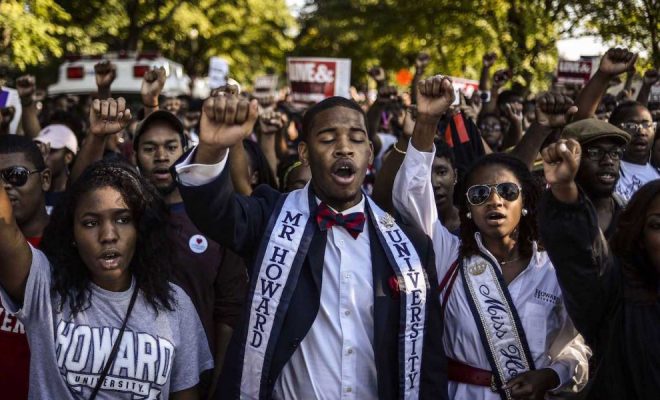How the justice system fails us after police shootings
Caren Morrison, Georgia State University
Two weeks ago, the police officer who shot Laquan McDonald in Chicago was charged with first-degree murder. Since then, the police superintendent was fired, and the Department of Justice announced that it will begin a large-scale investigation into the Chicago Police Department. Meanwhile, in Baltimore, one of the police officers charged in the death of Freddie Gray is standing trial.
You might think these high-profile cases mark a turning point in the nation’s response to fatal police violence. But 1,058 people have been killed by police this year to date alone, and most of the time, no legal charges follow. In my own state of Georgia, 171 people have been shot dead by police since 2010, and there have been zero prosecutions.
As a former federal prosecutor and a criminal procedure professor, I’ve been studying how prosecutors handle police violence cases. How do they deal with the conflict of interest raised by investigating the police departments they work with? Who determines whether a civilian death is justified, as the vast majority are found to be?
The results are not pretty.
A more typical example
The prosecutions in the McDonald and Gray cases are actually quite unusual. Many more cases are like that of Caroline Small, a 35-year-old mother of two who was shot to death in her car by two police officers in Brunswick, Georgia in 2010.
Small was unarmed. She was not suspected of any serious crimes. After a low-speed chase, her car ended up wedged tightly between two police cars and a utility pole. When she tried to pull forward, the officers shot her eight times.
Local TV told Small’s story.
The police officers said that they were afraid that Small was going to hit them with her car. The grand jury found the shooting was justified.
Small would have ended up as just another statistic if Brad Schrade, an investigative reporter from the Atlanta Journal-Constitution, hadn’t tracked down some of the former grand jurors and Georgia Bureau of Investigation agents who investigated the case.
The lead agent called it the worst police shooting he’d ever seen. But that was not what the district attorney, Jackie Johnson, told the grand jury – the people responsible for deciding if the officers should be charged with a crime.
Instead, Johnson showed them a blatantly inaccurate computer-animated reenactment of the scene, produced by the police department. The animation showed Small’s car turning sideways and hitting the officers. But, as one of the Georgia Bureau of Investigation agents swore in a deposition, “There is no way on this Earth that car could have moved in one swift motion through that gap.”
No one was ever prosecuted for the killing of Caroline Small. But the case exemplifies the toxic combination of powerful district attorneys and shadowy grand juries that has undermined public confidence in the criminal justice system’s ability to respond to cases of deadly police violence.
The secrecy of grand juries
Grand juries in all states have the power to investigate crimes, but the way they function is unusual in our mostly open justice system. Prosecutors go into grand juries alone, without opposing counsel, question witnesses in secret, and only release transcripts of the proceedings in limited circumstances.
So when grand juries failed to indict the police officers responsible for the deaths of Michael Brown and Eric Garner, the ensuing protests were not just a reaction to the decisions themselves. They were also a reaction to the way these issues of public concern are decided behind closed doors, without explanation.
In response, California became the first state to bar grand juries from investigating fatal police use-of-force cases, a rule that will come into effect in the new year. Instead, California prosecutors in police homicide cases will now present their evidence at a preliminary hearing before a magistrate judge, a proceeding that is adversarial and open to the public.
The power of prosecutors
But the problem goes beyond secrecy. The real issue is that the prosecutor controls whether a case goes forward at all. This is true whether the case proceeds by indictment or preliminary hearing. Other than public opinion and the possible pressures of reelection, no one oversees the prosecutors.
When a police officer kills a civilian, prosecutors have a number of options. Often, they simply do nothing, letting internal police department procedures handle the issue. No one can force them to prosecute. A prosecutor’s discretion to pick and choose among cases is absolute, and their reasons may not be second-guessed.
Sometimes, if a police killing is highly publicized – like when a dashcam video is released – a prosecutor may feel the need to do something, even if they don’t want to pursue the case.
Going into the grand jury and coming out without an indictment shifts apparent responsibility from the prosecutor to the grand jury. Prosecutors can say they tried, but the grand jury decided against them.
Except that’s not how grand juries work.
I was a federal prosecutor for five years and made dozens of grand jury presentations. Prosecutors see the same grand jurors week in and week out, on all different cases. They control the evidence the grand jury hears. Grand jurors can ask to hear additional evidence, but the prosecutor can talk them out of it. And if – God forbid – the grand jury refuses to issue an indictment, the prosecutor can go back in front of a different grand jury. It’s poor form, but it happens.
So when a prosecutor says, “The grand jury has spoken,” that usually means that the grand jury has reached the only conclusion the prosecutor allowed it to reach.
After the officers involved in Caroline Small’s death were cleared, Johnson commented, “I don’t control the results,“ as if she hadn’t deliberately tanked the case.
A former prosecutor from her office was blunt, telling a reporter, “This was a murder and it was covered up.” But at that time, Johnson was a recently appointed DA, and civil court records show that the police chief had sent a letter to the governor supporting her candidacy.
California’s plan is a start
California’s approach, making prosecutors proceed by public preliminary hearing rather than by grand jury, should help protect against the most blatant forms of sabotage by prosecutors.
But the law stops well short of requiring prosecutors to present evidence in all cases of police homicide. If states were serious about taking absolute discretion out of the hands of prosecutors, they could mandate that all cases of fatal police violence go to a public hearing to determine whether the case should proceed to trial.
After all, we can’t expect investigative journalists to uncover all the mishandled cases.
When a police officer causes the death of a member of the public, it shakes our faith in our public institutions and underscores the fragility of community-police relations. These incidents are matters of intense public concern. A more transparent process, one that addresses all police homicides, not just the ones that make headlines, would be an improvement.
![]()
Caren Morrison, Associate Professor of Law, Georgia State University
This article was originally published on The Conversation. Read the original article.



